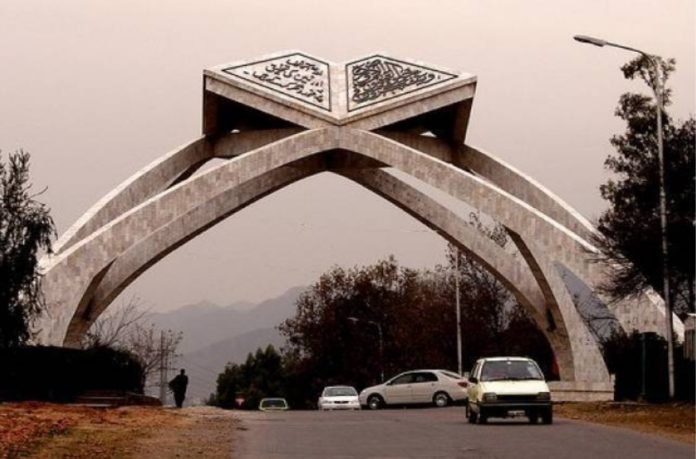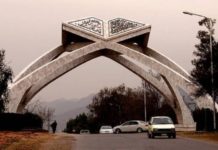On the campus of Quaid-i-Azam University (QAU) — Pakistan’s premier public university — stands a large, ornate palace with manicured lawns and parked SUVs, protected by menacing guards and dogs. The owner could well have been some Arab sheikh from Dubai but, in fact, this is the newly constructed residence of a former chairman of the Pakistan Senate and a member of the Pakistan People’s Party. It stands among other palatial houses now sprouting over dozens of acres of captured university land.
As I stood outside the palace, with the Margalla Hills in the backdrop, a thought left me saddened. In Western countries — which most Pakistanis trash as morally degenerate — the rich and influential want posterity to remember them through their donations of money and land to universities. But in our country wealthy people — even well-educated ones — steal from educational institutions and simply want to become wealthier still.
An early attempt to grab QAU’s land dates to 1996. This is when prime minister Benazir Bhutto had sought to reward her cronies in parliament by offering them plots on this university’s campus. To be bought at a fraction of the then market price, the land’s value was expected to multiply at least 10 times over just a few years. To short circuit potential resistance from QAU teachers and employees, they were offered smaller plots — also vastly underpriced. This once in a lifetime deal caused the campus to explode with joy.
Should public universities now buy their own AK-47s, rocket launchers and armoured vehicles?
Parliamentarians from the ruling party rushed to pay their first instalments and solemnise the transaction. As mountains of cash beckoned, consciences flew out of the window. Also queuing up were parliamentarians from opposition parties, eager for their cut of the pie. So lucrative was the deal that some spoke of switching party loyalties. Alarmed, the PML-N chief, Mian Nawaz Sharif, forbade his party’s members to participate in the land grab. His admonition fell upon deaf ears.
As it turned out, that deal collapsed. Determined opposition by two QAU teachers led to a prolonged, bitter struggle that was played out over 18 months in the public arena between 1996 and 1997. Public interest litigation with pro bono help from the eminent lawyer, Abid Hasan Minto, ultimately succeeded. The court ruled that QAU’s land was a public trust meant solely for future generations of Pakistanis, not convertible to private property. This victory, and the fortuitous dismissal of Bhutto’s government by president Farooq Leghari, put an end to the land grab. Or so it seemed.
But the land grabbers were to return 10 years later — this time surreptitiously. Few on campus were aware of the palace’s construction or that of others around it. The university’s subsequent vice chancellors and registrars had been persuaded — by what means one still does not know — to make no more than a token protest. And so, stealthily but speedily, ground realities changed. Surely, the Israelis are not the only people smart enough to know the value of rapidly constructing settlements on captured lands.
This brings us to today, 2016. A fresh new university administration has discovered to its amazement that it has inherited a campus with large chunks of land eaten away, expanding encroachments, as well as an illegal road under construction to speed up the theft. A pre-existing road that runs through the university now bears a changed signboard reading ‘Bukhari Road’, brazenly identifying the road with the palace owner.
What does the Capital Development Authority — the mighty maker and sometimes muscular enforcer of Islamabad’s zoning laws — have to say to all this? Or the interior minister? The short answer is: not much. Official requests from QAU over the years to verify existing maps and create visible demarcations have been deflected or stonewalled.
Tellingly, so far the CDA has acted on only one matter. For mysterious reasons it stopped construction of QAU’s boundary wall, the erection of which became a legal necessity after the terrorist attack on the Peshawar Army Public School in 2014. Minus this wall, encroachers can continue tampering local land records through easily bribed patwaris. One compares the CDA’s sluggishness on QAU against the alacrity with which it recently tore down the illegal mud and brick houses of Pathan Colony’s impoverished dwellers.
QAU is not the only public university that has lost land to qabza groups and land mafias. Punjab University, Karachi University, and many others have been robbed to different degrees. Still, Islamabad is very special. The price of land here competes with that in the pricey parts of London and New York. But even by Islamabad’s standards, QAU’s land — all 1,702 acres of it — is exceptionally valuable because, as the crow flies, the university is barely two miles away from the city’s centre and heart of Pakistan’s government. Coveted by countless many, this public university’s valuable land has few defenders.
Some highly placed civic officials, while wringing their hands in helplessness, have privately suggested that QAU should create a robust defence force in place of its lightly armed guards. So should public universities, including QAU, buy and learn to operate their own AK-47s, rocket launchers and armoured vehicles? If so, we shall then be walking down Somalia’s path into anarchy and lawlessness.
Consider this delicious irony: Third Avenue, which passes by the Diplomatic Enclave and the Chinese embassy, feeds directly into QAU. Running barely a mile or so behind the buildings of parliament, Supreme Court, and the prime minister’s house, it is a far cry from the 1,500-mile long CPEC corridor protected by 10,000 soldiers. But if rule of law is flagrantly violated under the noses of our leaders, what hope is there for Balochistan?
Pakistan’s leaders must soberly consider the consequences of losing control over the nation’s public lands and its public assets. QAU may be just the tip of the iceberg, but it is an acid test of governance. It is time to demonstrate steely resolve and disprove the notion that Pakistan is a failed state. Mian Nawaz Sharif had opposed the land grab in 1996. His government must now protect the public interest by protecting the land of Pakistan’s premier state university.








[…] میں احتجاجی تحریک کی بنیاد رکھی۔ آپ نے اس قضیے پر ایک اہم آرٹیکل لکھا، جس نے اس مسئلے کو مزید اجاگر کیا۔ اس سب کے نتیجے […]